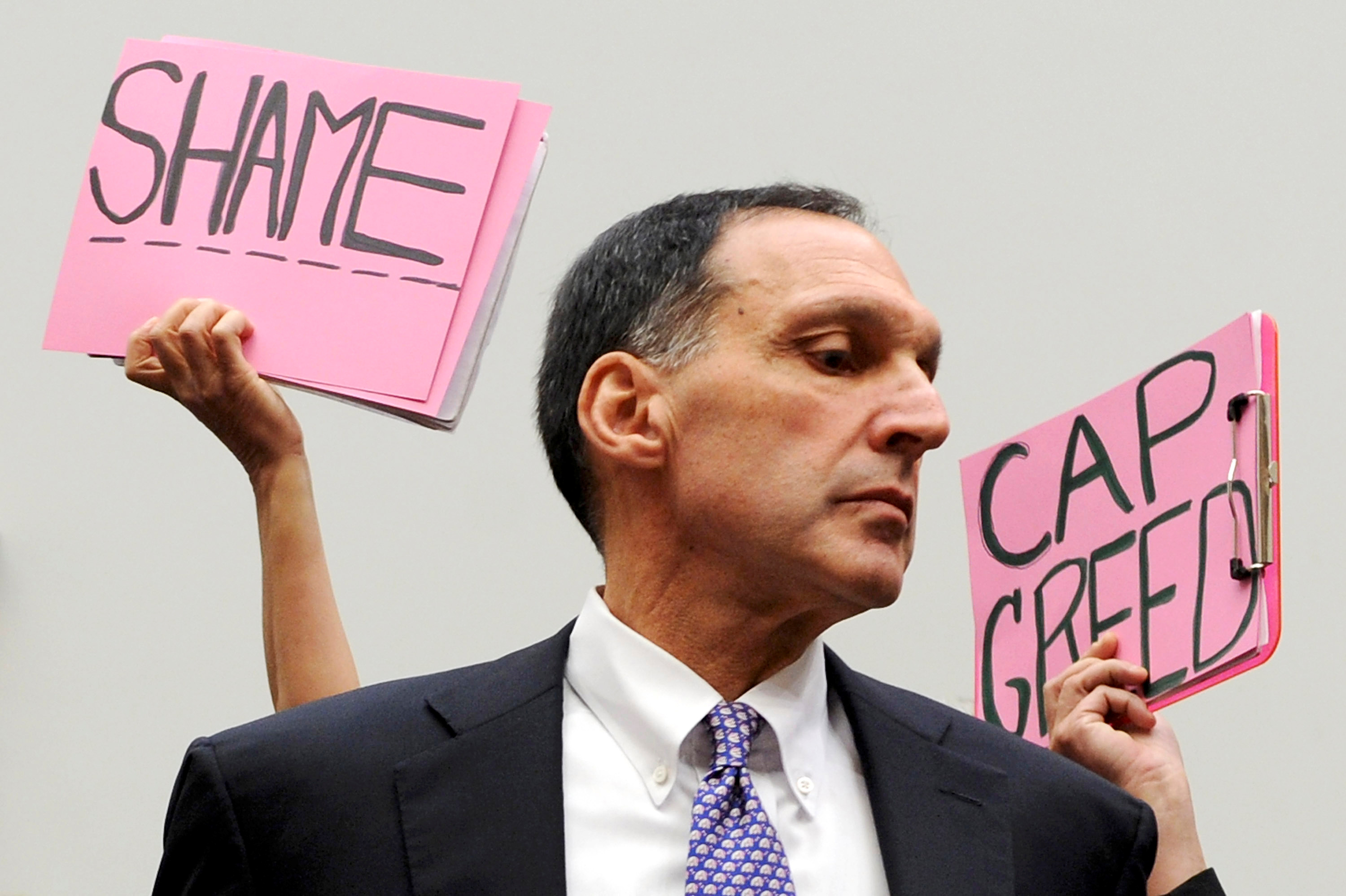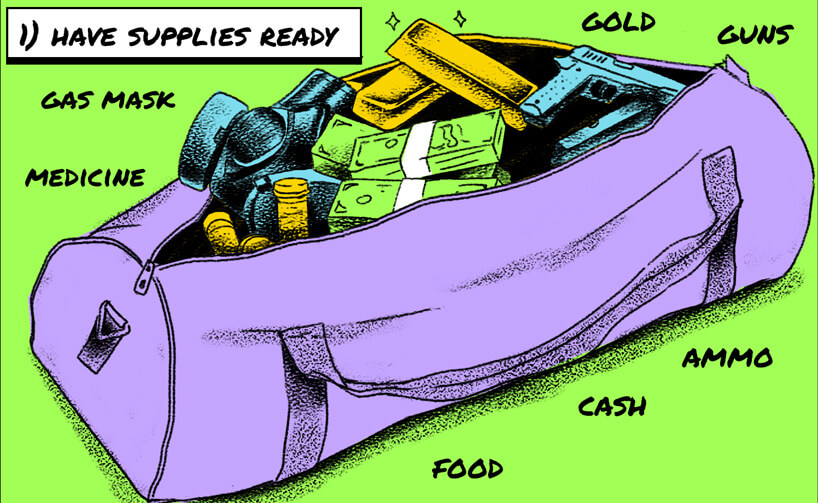– The “Lehman moment”… could it happen again?
– The finance industry is infested with moral hazard
– Even more moral hazard today sowing seeds of next crisis
– “Next crisis will not look the same as the 2008 crisis”
 Protestors hold signs behind Richard Fuld, Chairman and Chief Executive of Lehman Brothers Holdings after its collapse led to the last global financial crisis. REUTERS/Jonathan Ernst/File Photo
Protestors hold signs behind Richard Fuld, Chairman and Chief Executive of Lehman Brothers Holdings after its collapse led to the last global financial crisis. REUTERS/Jonathan Ernst/File Photo
A decade ago this week, in the US, the government had just nationalised government-sponsored mortgage lenders Fannie Mae and Freddie Mac.
In the UK, the then-chancellor, Alistair Darling, had, at the tail-end of August, given The Guardian one of the most honest interviews ever given by a serving Cabinet minister, in which he warned that we were facing the worst financial crisis in 60 years.
In short, we all knew things were turning bad.
But the full-on tipping point came with the demise of Lehman Brothers, which was barrelling towards the end of its existence.
This week, ahead of the tenth anniversary of the “Lehman moment”, we’re going to be looking at what happened, what’s changed, and whether it could happen again.
Today I want to start with one of the most important concepts you have to understand in order to grasp what went on.
That’s a phenomenon with the rather curmudgeonly name of “moral hazard”.
The finance industry is infested with moral hazard
The notion of moral hazard originated in the insurance industry. It’s a very simple concept. It refers to the danger that if someone is insured against a loss, then they won’t take the necessary steps to prevent that loss from happening in the first place.
So, used more widely, moral hazard is what you get when an individual’s actions are divorced from their consequences. Or as Paul Krugman (loosely paraphrased) puts it, it’s when you take the risk, but someone else bears the cost.
This one notion explains why the entire financial crisis happened.
Human beings respond to incentives. If you pay them to take risk and shield them from the lion’s share of the consequences, then you will get a system that skews towards careless risk-taking.
Let’s start with the finance industry. The finance industry runs almost entirely on Other People’s Money (OPM). That creates an immediate problem. The finance industry likes to present itself as a steward of OPM, from institutional investors to individuals. Instead, it more often cares about getting as big a chunk of that OPM as it can. The more it has, the more fees it can extract from it.
That incentivises the creation of complicated, fee-heavy products. It incentivises the expansion of balance sheets. It incentivises short-term behaviour.
And it incentivises careless expansionism, because caution is penalised if you are trying to win business in a “race to the bottom” environment – note that financial industry whistleblowers were fired or victimised in most cases ahead of the financial crisis.
“Career risk” – whereby falling behind your peers in a booming market means getting fired – militates against a more balanced approach. And a lack of genuine “skin in the game” – investing with your own money – means that the finance industry gets the upside with very little of the downside.
If you get paid a life-changing sum on an annual basis then does it matter if you get fired and the value of your shares collapses? Not really.
As Jimmy Cayne, the bridge-playing, dope-smoking ex-CEO of Bear Stearns, put it to finance writer William D Cohan, on the consequences for him of the financial crisis: “The only people [who] are going to suffer are my heirs, not me… Because when you have a billion six and you lose a billion, you’re not exactly, like, crippled, right?”
You can dismiss some of that as the macho bravado of a wounded Wall Street ego. But the basic point is true.
Ex-Lehman Brothers CEO Dick Fuld might cry himself to sleep every night, mourning his lost reputation (I don’t think he does, by the way, although it clearly still rankles with the man), but he’s crying himself to sleep on a big golden pillow.
Full article courtesy of Money Week here
LATEST VIDEO FROM GOLDCORE
Gold Surges to Record Highs in Emerging Market Currencies
News and Commentary
Gold slips as dollar firms on Sino-U.S. trade tensions (Reuters.com)
Nikkei jumps, but other Asian markets remain sluggish (MarketWatch.com)
Gold erases daily losses and approaches $1,200 (FXStreet.com)
S&P 500, Nasdaq look to snap 4-day losing streak; energy among biggest gainers (MarketWatch.com)
Europe leads fightback after Asian shares floored again (Reuters.com)
Source: Bloomberg
Ten years on: the biggest driver of the 2008 financial crisis has only got worse (MoneyWeek.com)
GOLD: The Day of Reckoning Approaches (Youtube.com)
New Zealand Is The Doomsday Escape Plan For Super Rich of Silicon Valley (Bloomberg.com)
Listen on SoundCloud , Blubrry & iTunes. Watch on YouTube below
Gold Prices (LBMA AM)
10 Sep: USD 1,195.80, GBP 923.28 & EUR 1,032.45 per ounce
07 Sep: USD 1,200.75, GBP 928.30 & EUR 1,031.32 per ounce
06 Sep: USD 1,204.30, GBP 931.65 & EUR 1,035.82 per ounce
05 Sep: USD 1,194.70, GBP 932.46 & EUR 1,031.74 per ounce
04 Sep: USD 1,195.75, GBP 932.57 & EUR 1,034.20 per ounce
03 Sep: USD 1,201.70, GBP 933.00 & EUR 1,035.75 per ounce
Silver Prices (LBMA)
10 Sep: USD 14.22, GBP 10.99 & EUR 12.28 per ounce
07 Sep: USD 14.19, GBP 10.90 & EUR 12.20 per ounce
06 Sep: USD 14.27, GBP 11.03 & EUR 12.27 per ounce
05 Sep: USD 14.17, GBP 11.05 & EUR 12.22 per ounce
04 Sep: USD 14.25, GBP 11.11 & EUR 12.33 per ounce
03 Sep: USD 14.53, GBP 11.27 & EUR 12.50 per ounce
Recent Market Updates
– London Property: Here Comes the Crash
– Gold Remains An “Excellent Way to Hedge” for Longer Term – BNP Interview
– September Is The Best Month For Gold and Worst Month For Stocks
– Pound Investors Face Months of Volatility Into Brexit Endgame
– Video: “Financial War” Deepens as Russia Buys Gold and Dollar Hegemony At Risk – Rickards on CNN
– Will Indebted Nations Globally Follow Venezuela Into Hyperinflation?
– End Of Dollar Hegemony May Happen Soon and Badly Impact Indebted America
– 10 Incredible Photos From Venezuela Show The Disastrous Risks Of Currency Devaluation
Listen on SoundCloud , Blubrry & iTunes. Watch on YouTube below
The post Ten Years Since Lehman: Biggest Driver of 2008 Financial Crisis Has Only Got Worse appeared first on GoldCore Gold Bullion Dealer.
![]()


